
Dementia and Geriatric Cognitive Disorders Extra
Scope & Guideline
Fostering collaboration for a brighter future in cognitive care.
Introduction
Aims and Scopes
- Cognitive Assessment and Profiling:
The journal emphasizes the importance of cognitive assessments to profile patients with dementia and related disorders, including studies on biomarkers, neuroimaging, and cognitive tests to understand cognitive decline. - Interventions and Therapeutic Approaches:
Research on psychosocial, pharmacological, and alternative therapies (like music therapy and exercise) aimed at improving the quality of life for patients with dementia and their caregivers is a significant focus. - Impact of Comorbidities on Cognitive Function:
The journal explores how comorbid conditions such as diabetes, depression, and hearing loss affect cognitive function and dementia progression. - Caregiver Support and Burden:
Understanding the challenges faced by caregivers of dementia patients, including interventions to alleviate caregiver burden and improve their well-being, is a critical area of research. - Socioeconomic and Environmental Influences:
Investigating how socioeconomic factors and environmental settings influence cognitive health and dementia outcomes among older adults is another core focus.
Trending and Emerging
- Technology and Artificial Intelligence in Dementia Detection:
Recent publications have increasingly highlighted the role of technology, particularly artificial intelligence, in early detection and monitoring of dementia, showcasing innovative methodologies for assessment. - Psychosocial Interventions:
There is a growing emphasis on psychosocial interventions aimed at both patients and caregivers, recognizing the importance of mental health and social support in managing dementia. - Post-COVID-19 Cognitive Health:
The impact of COVID-19 on cognitive health and the emergence of cognitive impairments among those recovering from the virus has become a significant area of interest, reflecting a timely response to global health challenges. - Cross-Cultural and Global Perspectives:
Research focusing on dementia across different cultures and settings is gaining traction, indicating a broader understanding of how dementia is perceived and managed worldwide.
Declining or Waning
- Traditional Pharmacological Treatments:
Research focusing solely on traditional pharmacological treatments for dementia has decreased, possibly due to a growing interest in holistic and alternative approaches to care. - Generalized Cognitive Impairment Studies:
There has been a shift away from broad studies on cognitive impairment towards more specific investigations into particular types of dementia or comorbid conditions affecting cognition. - Single-Domain Cognitive Assessments:
The trend appears to be moving away from single-domain assessments towards more comprehensive, multidimensional approaches that consider various cognitive and functional domains. - Retrospective Studies without Intervention Focus:
Retrospective studies that do not propose interventions or actionable insights have become less frequent, as the journal emphasizes practical outcomes and interventions for improving patient care.
Similar Journals
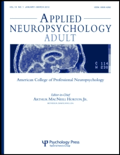
Applied Neuropsychology-Adult
Transforming knowledge into practice for adult populations.Applied Neuropsychology-Adult is a premier journal published by Routledge Journals, Taylor & Francis Ltd, dedicated to advancing the field of neuropsychology with a particular focus on adult populations. Since its inception in 2012, this journal has been a vital platform for disseminating innovative research, reviews, and clinical insights into the cognitive and psychological processes that influence adult behavior and functioning. With an impressive Scopus ranking, including Q3 status in both Developmental and Educational Psychology and Neuropsychology and Physiological Psychology, it demonstrates a commitment to high-quality scholarship that informs both clinical practice and theoretical understanding. Researchers, clinicians, and students alike will benefit from the journal's commitment to open access, providing broad access to valuable knowledge in the domain of neuropsychology. As it converges towards its 2024 milestone, Applied Neuropsychology-Adult continues to be an essential resource for those seeking to deepen their understanding of neuropsychological processes and their application in real-world settings.
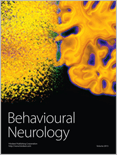
BEHAVIOURAL NEUROLOGY
Charting New Territories: The Dynamic Field of Behavioral NeurologyBEHAVIOURAL NEUROLOGY is a distinguished open-access journal published by Hindawi Ltd, dedicated to advancing the field of neurology and neuropsychology since its inception in 1988. With ISSN: 0953-4180 and E-ISSN: 1875-8584, this journal provides a platform for innovative research and interdisciplinary studies that explore the intricate connections between behavior and neurological processes. Housed in the Netherlands, BEHAVIOURAL NEUROLOGY enjoys a commendable reputation, boasting impressive quartile rankings of Q2 in various medical and psychological categories, reflecting its significant contribution to the literature with a focus on clinical neurology and physiological psychology. The journal's rigorous peer-review process ensures that published works meet high academic standards, making it an essential resource for researchers, clinicians, and students seeking to deepen their understanding of neurological disorders and cognitive function. As of 2023, it ranks in the 80th percentile in neuropsychology, further underscoring its impact and relevance in the scientific community. For those interested in accessible knowledge, BEHAVIOURAL NEUROLOGY's commitment to open access facilitates the dissemination of groundbreaking research, allowing a wider audience to engage with critical advancements in the field.
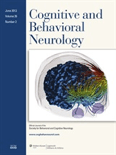
Cognitive and Behavioral Neurology
Advancing the Frontiers of Cognitive and Behavioral NeurologyCognitive and Behavioral Neurology is a prominent peer-reviewed journal dedicated to advancing the understanding of cognitive and behavioral aspects of neurological disorders. Published by Lippincott Williams & Wilkins, this journal has established itself as a vital resource for researchers, clinicians, and students in the fields of cognitive neuroscience, neuropsychology, and psychiatry. With an ISSN of 1543-3633 and an E-ISSN of 1543-3641, it offers a robust platform for the dissemination of high-quality research, as evidenced by its positioning in the Q3 quartiles across various categories, including Cognitive Neuroscience and Psychiatry. The journal, which has been actively publishing since 2003, encourages innovative studies that explore the intersection of cognition and behavior in neurological contexts. As a vital contributor to the academic dialogue on these topics, it provides an essential archive of findings and discussions that inform clinical practice and educational approaches, reflecting its commitment to improving patient outcomes and enhancing neurological science.

JPAD-Journal of Prevention of Alzheimers Disease
Leading the Charge in Alzheimer’s Prevention StrategiesJPAD - Journal of Prevention of Alzheimer’s Disease, published by Springer Basel AG, is a premier academic journal dedicated to advancing research in the critical field of Alzheimer’s disease prevention. Its impactful contributions to the fields of neurology, psychiatry, and mental health have led it to achieve a Q1 ranking in multiple categories, including neurology (clinical) and psychiatry and mental health. Since its inception in 2017, JPAD has become an essential platform for researchers and professionals aiming to stay at the forefront of developments in Alzheimer’s disease research, prevention strategies, and innovative therapies. The journal provides a valuable open access option for disseminating high-quality research to a global audience, enhancing its visibility and impact. With its strategic focus and rigorous peer-review process, JPAD is committed to fostering collaboration and knowledge exchange among scientists, clinicians, and practitioners, ultimately contributing to the global effort to combat Alzheimer's disease.
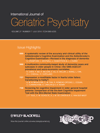
INTERNATIONAL JOURNAL OF GERIATRIC PSYCHIATRY
Transforming geriatric psychiatry through impactful insights.International Journal of Geriatric Psychiatry, published by Wiley, stands as a premier journal dedicated to advancing the field of mental health in older adults. With an impressive impact factor reflective of its Q1 categorization in both Geriatrics and Gerontology, as well as Psychiatry and Mental Health, this journal addresses the critical intersection of aging and mental health, providing a platform for impactful research from 1986 through 2024. Researchers and professionals will find the journal invaluable, as it offers comprehensive insights into a range of subjects pertinent to geriatric mental health, with its ranking in Scopus highlighting its academic rigor and relevance (Rank #147/567 in Psychiatry and Mental Health; Rank #37/116 in Geriatrics and Gerontology). Though it operates on a traditional subscription model, the journal's significant contributions to the understanding of psychiatric disorders in the elderly make it a key resource for anyone involved in geriatric care and research.

Alzheimer's & Dementia: Diagnosis, Assessment & Disease Monitoring
Elevating standards in clinical practice through innovative research.Alzheimer's & Dementia: Diagnosis, Assessment & Disease Monitoring, published by WILEY, stands at the forefront of research in the fields of neurology and psychiatry. As an Open Access journal since 2015, it fosters transparency and accessibility in sharing critical knowledge pertaining to the diagnosis, assessment, and monitoring of Alzheimer’s disease and related dementias. With an impressive impact factor reflected in its Q1 rankings in both Neurology (Clinical) and Psychiatry and Mental Health, this journal is recognized for its significant contribution to advancing understanding and improving clinical practices, as evidenced by its Scopus rankings in the top percentiles. Researchers, healthcare professionals, and students are encouraged to engage with the latest findings and methodologies that shape the future of dementia care, enhancing both patient outcomes and the scientific community's response to this pressing health challenge. With its headquarters located in Hoboken, NJ, this journal is a pivotal platform for disseminating high-quality, peer-reviewed research that strives to combat one of the most challenging areas in medicine today.

Aging Medicine and Healthcare
Advancing Knowledge to Enhance Elderly CareAging Medicine and Healthcare is a leading Open Access journal dedicated to advancing the understanding of geriatric health and the complexities of aging. Published by the Asia Pacific League Clinical Gerontology & Geriatrics, this innovative journal began its journey in 2019 and has since established itself as an important resource for healthcare professionals, researchers, and students interested in the fields of geriatrics and gerontology. With an impact factor that reflects its growing significance (ranked in the 21st percentile within its category), the journal aims to disseminate high-quality research and practical insights that can inform clinical practice and enhance patient care for aging populations. As an Open Access publication, it ensures that research findings are freely accessible, fostering collaboration and knowledge sharing among academics and practitioners globally. The journal is poised to be a vital platform for innovative studies, systematic reviews, and case reports that illuminate the challenges and opportunities in aging medicine.
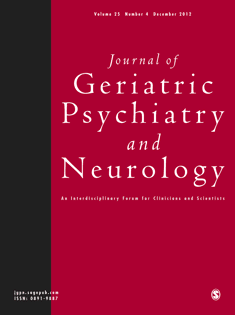
JOURNAL OF GERIATRIC PSYCHIATRY AND NEUROLOGY
Advancing knowledge in aging and mental health.JOURNAL OF GERIATRIC PSYCHIATRY AND NEUROLOGY, published by SAGE PUBLICATIONS INC, is a premier academic journal dedicated to advancing the understanding of mental health issues and neurological disorders in the aging population. With an established presence since 1988, this journal stands out in the fields of Geriatrics, Gerontology, Neurology, and Psychiatry, currently positioned in the Q2 category based on 2023 metrics, reflecting its influence and academic rigor. The journal is indexed in major databases and is highly regarded for its contributions, as evidenced by its strong Scopus rankings. It serves as an essential resource for researchers, clinicians, and students, offering insightful articles that explore the complex interplay between aging, mental health, and neurological conditions. Although it does not provide open access, it continues to be a vital source of scholarly knowledge for those dedicated to enhancing the well-being of the elderly population.

JOURNAL OF ALZHEIMERS DISEASE
Empowering professionals with cutting-edge research.Journal of Alzheimer's Disease, published by IOS Press, stands as a pivotal resource in the fight against Alzheimer's and related neurodegenerative disorders. With an ISSN of 1387-2877 and an E-ISSN of 1875-8908, this esteemed journal has evolved since its inception in 1998, providing a vital platform for academic research and clinical practice in the realms of Clinical Psychology, Geriatrics and Gerontology, Neuroscience, and Psychiatry and Mental Health. Ranked in the Q1 category across several disciplines, including Clinical Psychology and Geriatrics, this journal not only highlights significant advancements in understanding Alzheimer's disease but also fosters interdisciplinary dialogue among researchers, healthcare professionals, and policymakers. Boasting robust Scopus rankings—such as 49th in Clinical Psychology and 29th in Geriatrics—this journal is committed to disseminating high-quality research that informs both therapeutic strategies and public health initiatives. The Journal of Alzheimer's Disease is an essential resource for anyone dedicated to exploring the complexities of cognitive decline and enhancing care for affected individuals.
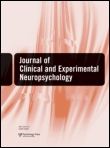
JOURNAL OF CLINICAL AND EXPERIMENTAL NEUROPSYCHOLOGY
Bridging clinical practice and experimental insights.The Journal of Clinical and Experimental Neuropsychology, published by Taylor & Francis Inc, stands as a pivotal resource in the realms of clinical psychology and neuropsychology. With an ISSN of 1380-3395 and an E-ISSN of 1744-411X, this journal has been a hallmark of scholarly excellence since its inception in 1985, continuing to shape the fields until 2024. It is renowned for its rigorous peer-reviewed articles and has garnered significant recognition, achieving a Q2 ranking in Clinical Psychology and Q3 rankings in various other relevant categories as of 2023. Serving as a bridge between clinical practice and experimental research, the journal underscores the critical role of neuropsychological assessment and intervention in enhancing mental health outcomes. Although not an open-access journal, it provides significant insights and empirical data that are crucial for researchers, clinicians, and students dedicated to advancing the understanding of cognitive functioning and psychological health. The journal's commitment to disseminating high-quality research contributes to its reputation and impact, making it a vital resource for those engaged in the study of neuropsychology and its clinical applications.